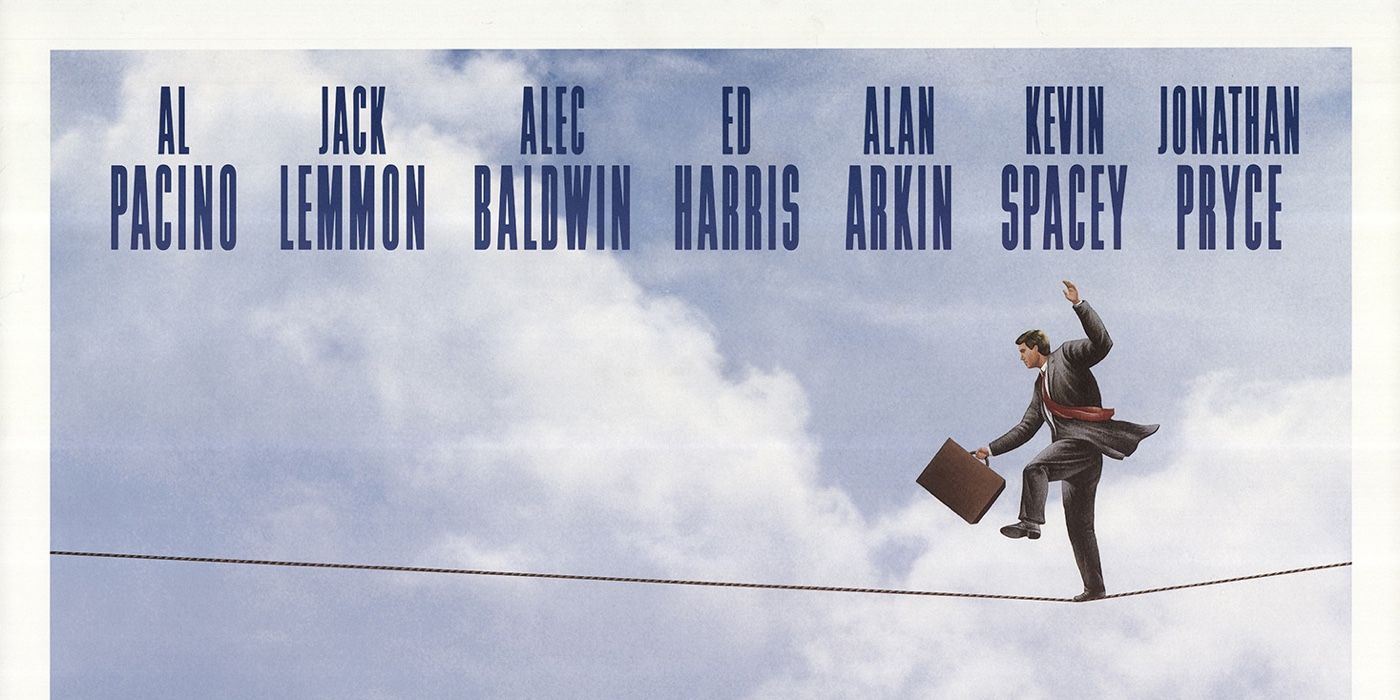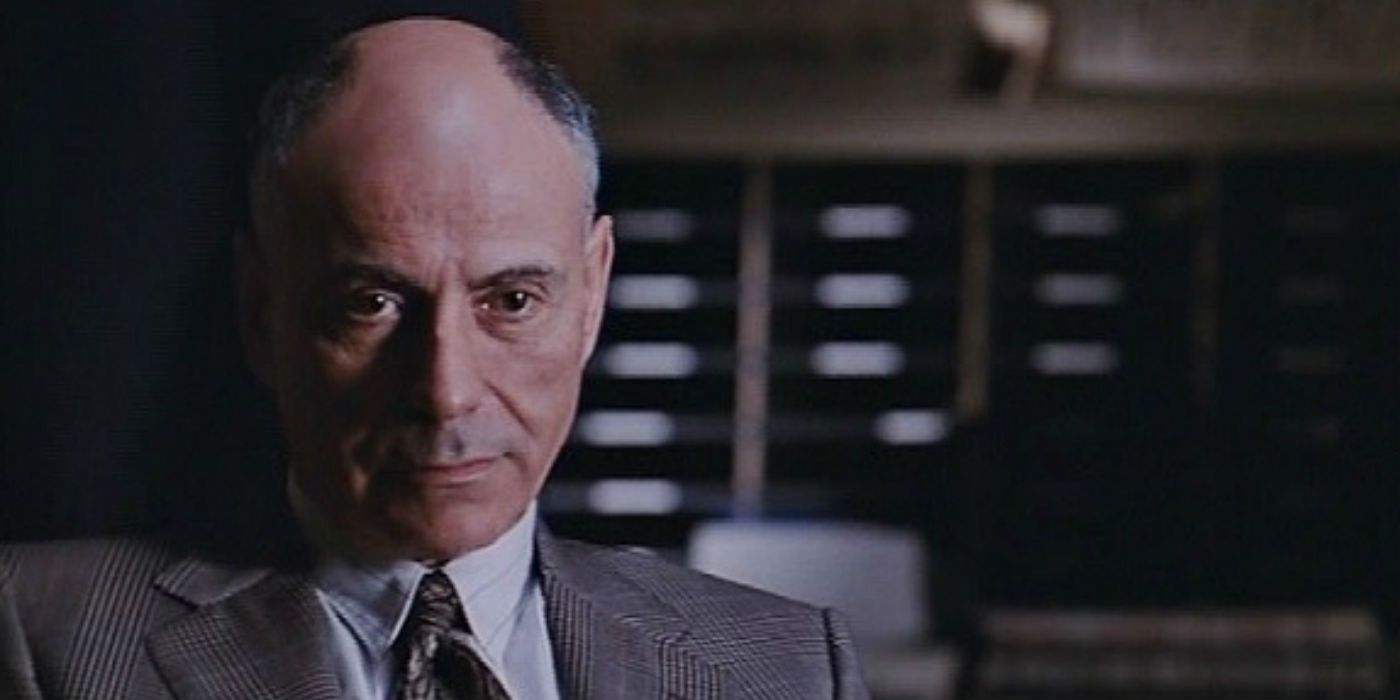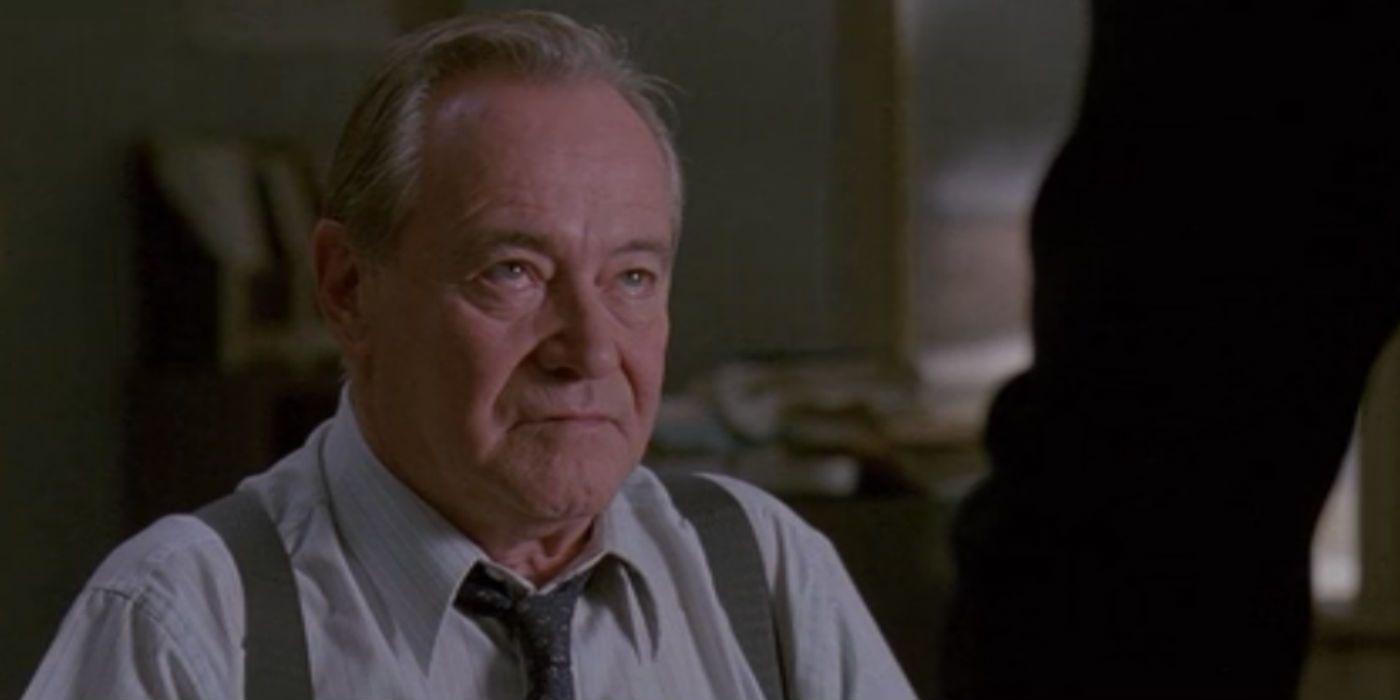This movie has one of the finest casts imaginable... what a joy to watch them work together. And unlike most movies that come out of Hollywood, this one actually has a point to make. Only an abundance of profanity and weak direction detracted from my enjoyment of this movie.
It could be said that 1992 was Al Pacino's year. He appeared in Glengarry Glen Ross, which got him an Oscar nomination for Best Supporting Actor. He also appeared in Scent of a Woman, for which he won the Oscar for Best Actor. In addition to all that, he became the first actor in movie history to be nominated for two acting awards from two different movies in the same year. (Jamie Foxx would become the second actor to accomplish that 12 years later.) I've always had mixed feelings about Pacino. In his early years, Pacino was taken very seriously as an actor, and his film roles reflected that. However, since the late 80's, it seems like most of his roles have been caricatures. His trademark style is to let loose with a buggy-eyed, profanity-laden tirade; in some of his movies, that's about all he does. Sadly, the number of movies that choose to explore the quiet, pensive side that allows him to really shine as an actor are few and far between, but Glengarry Glen Ross happens to be one of them. Oh, don't get me wrong; he still does plenty of profanity-laden, top-of-his-lungs ranting, but there's enough variety in his character to make his Oscar nomination well-deserved. However, I want to note for the record that I think Jack Lemmon's Oscar snub should have been declared a crime against humanity. More on that later...
I have to admit that back in 1992, when this movie was first released, I had no need to see it. Why would I want to see a movie based on a stage play? (The only exception at the time was A Few Good Men.) Doesn't everybody stand around talking during stage plays? I wanted to see action and suspense, and you don't get that during stage plays... do you? Well, today, nearly 13 years later, I have warmed up a little bit to stage plays. I still don't like how most plays are negative and depressing (are they just "keeping it real?"). To me, a big part of telling a story is not just in the words, but in the way you use imagery to convey the desired emotions (i.e. camerawork). There are ways to accomplish the same thing in stage plays, but movies click with me better on that level. Right or wrong, good or bad, that's just how it is with me. If a movie purports itself to be based on a stage play, successful or not, it makes it that much harder to get me out to the theater to see it. Long story short, I didn't see Glengarry Glen Ross in a theater, but I'm glad I saw it.
Based on the popular stage play by David Mamet, the title comes from Glengarry Glen and Glen Ross Farms, two of the real estate offerings that are mentioned in the movie. Things start out fairly quickly, with several salesmen who work for a real estate company being called to a late-night meeting. Of course, all of them are a little upset at having to go into work so late, and they get even more upset when they realize that the company's main office has sent one of its top salesmen (played by Alec Baldwin) to give them a pep talk. Of course, I use the term "pep talk" loosely, since one of his first lines is "As you all know, first prize is a Cadillac Eldorado. Anybody want to see second prize? Second prize is a set of steak knives. Third prize is you're fired." He then goes on to inform them in a similarly gentle way that everyone who was called into that late-night meeting is there for a reason: Their recent sales figures are unacceptable, and unless they seriously step up their game within one week, they will be fired. He then holds up a pack of cards, each of which has one sales lead on it. They're the expensive, primo leads — the "Glengarry leads" as they will become known. But they can't have them, because the Glengarry leads are only for closers. With that, the salesmen are sitting by themselves, left to wonder how on earth they're going to drum up any business with the sub-standard sales leads they have been provided. (Keep in mind, this particular real estate company primarily sells undesirable properties to uninterested prospective buyers, and their salesmen have to use unethical and/or illegal tactics to make their sales. The movie Boiler Room, which dealt with very similar subject matter, was heavily influenced by this movie.)
It is here that we really start to get a sense of who the characters are. Some of them, such as Dave Moss (played by Ed Harris) and George Aaronow (played by Alan Arkin), immediately leave the workplace, muttering about how unfair the company has been to them, while others such as Sheldon Levene (played by Jack Lemmon) immediately get to work and start going through the leads. Well, actually, that's not entirely true. First, Sheldon makes a few personal calls, then he tries to bribe his boss, John Williamson (played by Kevin Spacey), into selling him the Glengarry leads. Pop quiz, boys and girls: Is that a bad idea or a terrible idea? But eventually, he puts his nose to the grindstone and starts making some calls. The scenes of Sheldon making those calls really blew me away. The subtleties of his performance were absolutely astounding. I always remembered Jack Lemmon as the old guy from Grumpy Old Men and My Fellow Americans. But to get a sense of what an incredible actor he was, watch him doing those scenes. As he delivers his "radio announcer" voice to the prospective customer, he sounds at least somewhat enthusiastic, but his face tells a completely different story. He looks defeated, tired, even bored. Maybe I don't really understand what that business is like, but there was at least one prospective customer who agreed to see Sheldon at 10 p.m. that night. If you tried that kind of foolishness in my neighborhood, you would either be arrested or shot. But I digress... Suffice it to say that Lemmon should have been nominated for an Oscar. I'm not saying Pacino was undeserving, but Lemmon's Oscar snub was a classic example of how The Academy ™ doesn't have a clue.
Meanwhile, Dave and George are drowning their sorrows in booze across the street. They grumble and gripe for a while about how unfairly the company has been treating them, then Dave gets an idea. What if someone stole the Glengarry leads and sold them to their competitor, Jerry Graff? (That character does not physically appear in the movie, in case you were wondering.) But of course, even though Dave talks tough, he's really a spineless wimp, so he tries to talk George into stealing the leads. ("I can't do it myself; I'm the first person they'll ask about it!") George, being even more spineless than Dave as well as very weak-minded, reluctantly agrees.
The next morning, everyone shows up to work, and sure enough, there was a burglary. Not only are the Glengarry leads missing, but also the phones and a few sales contracts. At this point, we start finding out more about Ricky Roma (played by Al Pacino), the current sales leader at that location. Ricky is very upset because several of the missing contracts were his, and so now he has to go through the process all over again. John Williamson, the manager, is also very upset because of the burglary. He calls in a police detective (played by Jude Ciccolella) to investigate. Between having no phones and having to deal with the detective, the salesmen can't get any work done, so Dave heads home immediately. Sheldon isn't going anywhere, though; he wants to let everybody know about the sale he made last night. We find out throughout the movie that Sheldon used to be an excellent salesman; in fact, his nickname was "The Machine." Over the years, though, his performance has slipped and he has become mostly superfluous, so he does not try to hide his joy in being called "The Machine" once again by his coworkers after they find out about his recent sale. I especially enjoyed the dialogue between Sheldon and Ricky. Watching Lemmon and Pacino work together was absolutely delightful. Their mannerisms and personalities are so different, and yet their characters interacted so well with each other... you have to see it to understand what I'm talking about.
The last part of the movie is the most powerful part of the movie. I won't reveal how everything turns out, but I will say that after you finish watching this movie, you'll understand that the movie has a point to make. What I took away from the movie was simply this: You alone are responsible for your own predicament. You alone have the power to either become a success or end up a failure who can't stop whining about how unfair everybody and everything is.
Now that we have the good parts of the movie out of the way, let's talk about the not-so-good parts. I always thought this movie was directed by Mamet (he has gone on to write and direct quite a few other movies), but it was actually James Foley who directed it. Foley suffers from the same weakness as almost every other director who directs a stage play adaptation: He can't seem to remember if he's directing a play or a movie. Some scenes flow well, like a movie should, but others flow just like a stage play. (As an example, many scenes show actors who aren't talking and don't have enough of a reaction to contribute to what is being said, so why show them? Concentrate on the person who is talking instead.) One of the classic "stage play" scenes is when John Williamson is getting insulted and cussed out by Sheldon. He stands there with his back to Sheldon, and his arms are crossed. Not only is that quite typical for a stage play, but it's not even realistic. If I cussed out my boss at work, he would not have his back to me with his arms crossed, absorbing every word I said. He would be calling security to escort me out of the building. In another scene, Ricky berates and cusses John out, but John just stands there listening with a smirk on his face. That's not realistic, people!
The movie's other big weakness was a very high dose of profanity. According to IMDB, Glengarry Glen Ross contains 138 instances of the "f word" and 50 utterances of the "s word." Sometimes it seemed like every other word was profanity. Okay, I understand that writers feel a need to use high doses of profanity to illustrate just how "rough around the edges" a character is, but this movie really took that to an extreme. Has it ever occurred to them that most of us actually try to avoid potty-mouth language whenever possible (and it's always possible)?
I am sure that there are some people out there who absolutely adore the stage and believe it's the only true acting medium. That's fine; I'm not in a position to disagree with you. There's nothing wrong with that viewpoint. I'm only saying that I reviewed this movie from the standpoint of someone who watched it to see a movie, not a stage play, and I had certain expectations regarding the "feel" and "flow" of the movie. With all that said, I immensely enjoyed Glengarry Glen Ross, and I highly recommend it for anyone who enjoys top-notch acting and an interesting storyline. It's a joy to watch such an immensely talented cast working together, especially Lemmon and Pacino, and Alec Baldwin does the finest acting of his career even though he's only on screen for about five minutes. At first, I thought it would have been a good idea for Mamet to tone down the profanity so that the movie wouldn't have an "R" rating and younger people could see it, but I don't think the younger audiences could really appreciate what this film is trying to say. It's a movie about working stiffs, made for working stiffs.



